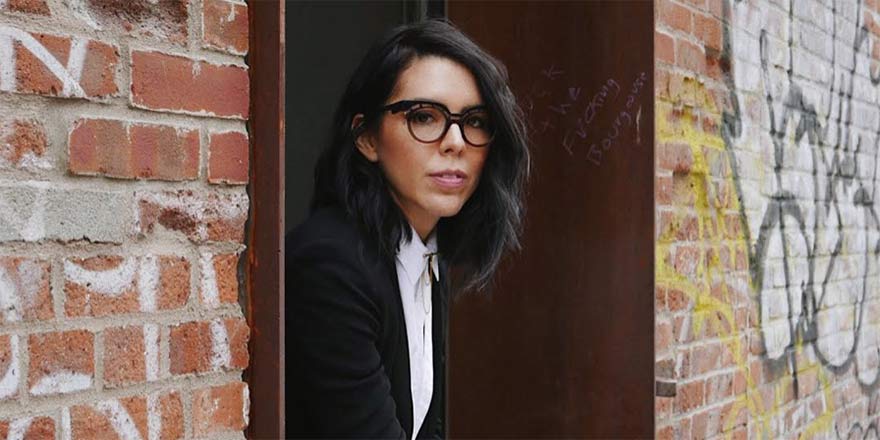
Visiting Professor at SLC, Editor-in-Chief of No Tokens
The best days of my childhood were spent with my Chinese grandmother teaching me to set the margins on our IBM Selectric so I could write about pirates and flying horses and teen runaways. I am still writing the same stories I wrote when I was 5, and I think that's a great thing.
T Kira Mahealani Madden is a lesbian APIA writer, photographer, and amateur magician living in Hudson Valley, New York. She holds an MFA in Writing with a focus on creative writing from Sarah Lawrence College and a BA in design and literature from Parsons School of Design and Eugene Lang College. She is the founding editor-in-chief of No Tokens, a magazine of literature and art, and is a 2017 NYSCA/NYFA artist fellow in nonfiction literature from the New York Foundation for the Arts. She has received fellowships from MacDowell, Hedgebrook, Tin House, DISQUIET, Summer Literary Seminars, and Yaddo, where she was selected for the 2017 Linda Collins Endowed Residency Award. She facilitates writing workshops for homeless and formerly incarcerated individuals and currently teaches in the MFA program at Sarah Lawrence College. Her debut memoir, Long Live the Tribe of Fatherless Girls, was a New York Times Editors' Choice selection, a finalist for the National Book Critics Circle John Leonard Prize, and a finalist for the Lambda Literary Award for lesbian memoir. There is no period in her name.
Can you describe your first inklings that you were a writer? How did you know?
The best days of my childhood were spent with my Chinese grandmother teaching me to set the margins on our IBM Selectric so I could write about pirates and flying horses and teen runaways. I am still writing the same stories I wrote when I was 5, and I think that's a great thing.
Can you tell us about yourself and your background before you joined the MFA in Writing program at Sarah Lawrence?
I was a near high school dropout, and then a near college dropout, but made up credits in summer school in order to receive a diploma. I was in fashion school, following the path of my family because I didn't yet know how to think or want for myself. I took community night classes in writing, and when I found that tingly-transcendent-lost-in-the-page feeling it was like, Oh. This. This is what I'd like to spend my life studying. Above all else, I'll be a student of words for the rest of my life. The writing is never as big, or as important, as what's already there for you in the books.
What made you choose to pursue your MFA at Sarah Lawrence?
Sarah Lawrence is the only program that accepted me. I think it's just as important to talk about the big Noes as it is to flaunt the Yeses. I feel incredibly grateful to have been offered that chance and opportunity to learn and to grow.
Describe the MFA in Writing program using a simile.
There's a soup simile somewhere here—something about many steps, comfort, nourishment, work—but I can't quite find the flavor profile. Sarah Lawrence taught me that building a solid simile can take years. Sometimes it should.
Who influenced you most during your time in the program? Do you have a favorite professor, mentor, or class?
I was so lucky to study with Mary Morris first, who recognized my care for language but encouraged me to take a step back and study structure. Mary brings so much joy and care to her pages and it shows; I learn so much from every new book of hers. Suzanne Hoover was my instructor and my thesis adviser. The work, for Suzanne, isn't just memorizing the right passage or knowing the vocabulary. It's in the living, the conversations, the movies, the plants, our histories, a cup of tea. I admire her to the ends of this earth. She's the smartest person I'll ever know, the voice in my head every time I write, my story doctor, still.
Do you have any advice for current or prospective students?
The publications, the awards, the lists—those are false bars. If you can leave this program understanding and honoring your craft and your process more deeply, if you can hook into the questions and obsessions and habits that will keep you writing after a workshop deadline, that is the real work. The real win.
Describe your career trajectory and what you are doing now.
I'm fortunate enough to teach, which is my favorite way to spend time. To spend days talking through what makes a sentence or story light up, and to encourage writers to take up space with their ideas, especially those who have been told their ideas aren't worthy of this false construct of "high literature." When I'm not teaching I'm writing, or reading, or riding horses, or cooking a tedious meal, or watching a movie for the 900th time.
Where can we find examples of your writing or purchase your books?
My book, Long Live the Tribe of Fatherless Girls, can be purchased at bookshop.org. Please support the indies and your local libraries, whenever and however you can.
What are you currently working on?
The screenplay adaptation of Long Live, a novel about queer sex and television, and a collection of horror stories.